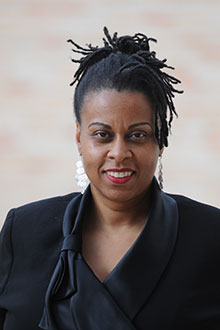
Kali Gross, professor of African American studies at Emory University, has been named one of 26 recipients of the 2021 Andrew Carnegie Fellowship.
Kali Gross, professor of African American studies at Emory University, has been named one of 26 recipients of the 2021 Andrew Carnegie Fellowship. Each fellow receives $200,000 to fund significant research and writing in social sciences and the humanities that addresses important and enduring issues confronting society.
Gross’s Carnegie project will shed new light on capital punishment in the United States through the histories of Black women disproportionately condemned. She aims “to better understand how it is that Black women became so grossly overrepresented among those put to death in the United States, especially by means of the electric chair.”
The fellowship will support Gross’s work at archives across the country to examine capital cases involving Black women. “This history is essential for ongoing efforts to eradicate structural racism in our nation’s criminal justice system,” says Gross, “and it will fill a crucial gap in historical studies of lethal punishment in America.”
“Professor Gross’s scholarship has shined a bright light on the experiences of Black women in America, telling vital stories and deepening our understanding of our nation’s past and present,” says Gregory L. Fenves, Emory University president. “I am grateful that the Carnegie Corporation will support her groundbreaking research and writing with this prestigious fellowship.”
Gross has published widely on Black women’s historical experiences in the U.S. criminal justice system. Her award-winning books include “Colored Amazons: Crime, Violence, and Black Women in the City of Brotherly Love, 1880–1910,” winner of the 2006 Letitia Woods Brown Memorial Book Prize; “Hannah Mary Tabbs and the Disembodied Torso: A Tale of Race, Sex, and Violence in America,” winner of the 2017 Hurston/Wright Legacy Award for Nonfiction; and “A Black Women’s History of the United States” (co-authored with Daina Ramey Berry). Her commentary and opinion pieces have appeared in The Washington Post, The Root and Politico.
About the Carnegie fellows
The Carnegie Corporation launched the Andrew Carnegie Fellows Program in 2015 as an initiative that was conceived by the late Vartan Gregorian, who served as president of the foundation from 1997 until his death on April 15, 2021.
Gregorian, a former professor of history and past president of Brown University, aimed to advance and elevate the work of the fellows to reinforce the importance of the social sciences and humanities in academia and American life. The program was inspired in part by an early fellowship that Gregorian received that helped catapult his career.
The most generous stipend of its kind, the Andrew Carnegie Fellows Program has funded a total of 216 scholars, journalists, and authors, representing an investment of $43.2 million. It focuses on subjects such as U.S. democracy, the environment, technological and cultural evolution, and international relations. The criteria prioritize the originality and promise of the research, its potential impact on the field, and the scholar’s plans for communicating the findings to a broad audience.
This year’s Carnegie fellows were selected from more than 300 nominations. Other fellows’ winning research topics address issues related to pandemic recovery, voting access, racial justice, rural opportunity, the “Me Too” movement, immigration and climate change. The award is for a period of two years and its anticipated result is a book or major study.
“Vartan and I agreed that the caliber of the proposals presented by this year’s fellows was exceptional, showing great potential in helping to solve the social, political, and economic challenges facing our world today,” says John J. DeGioia, chair of the Andrew Carnegie Fellows Program jury and president of Georgetown University. “These projects fulfill Vartan’s vision of universities, academies and academic associations playing an essential role in producing critical information and advancing knowledge through scholarship.”
